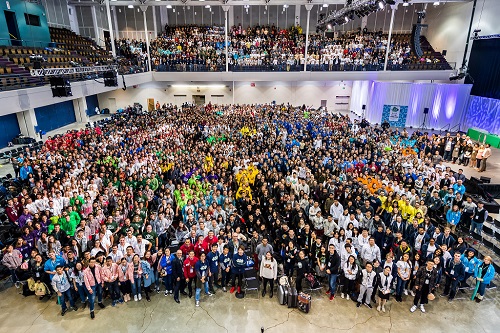iGEM stands for international Genetically Engineered Machine and it is the world’s largest (student) competition on synthetic biology . Each summer since 2004, student teams from all over the world work towards solutions for societal problems that involve applications of synthetic biology.
However, the competition demands more from the students than just designing technical fixes. They must also incorporate the importance of safety and the perspectives of various types of stakeholders in their designs – from end-users to policy-makers, and from locally affected communities to Civil Society Organisations. The scope of the competition is large – in 2016 almost 6000 students participated in teams from 40 countries.
Group picture at iGEM jamborree 2016
RIVM’s involvement in iGEM
For the Dutch Institute for Public Health and the Environment, RIVM, the gathering of so many future biotechnologists worldwide is an ideal place to gain insight into topical developments in biotechnology and the ways in which safety needs to be taken into account. Moreover, iGEM provides a setting in which RIVM develops and tests new and innovative ways to educate, stimulate and activate students to develop projects that are Safe-by-Design. In 2018, for example, RIVM developed the 'Safe-by-Design Serious Game', which challenges iGEM contestants to develop a market-ready product that is Safe-by-Design. Building on iGEM experiences, knowledge and technical insights, students who play this game experience what kind of issues will encounter and need to address when developing a safe-by-design product that is ready for launch in the real world.
Working Safe-by-Design challenges to go beyond the laboratory, to take real-world issues and elements into account. In the context of iGEM, incorporating all such non-technical issues is referred to as human practices. Human practices topics include safety and risk assessment, security, legal and regulatory affairs, public engagement, ethics and philosophy, education, product design and scale-up. Taking all of this into account in a project, comes closest to guaranteeing that innovations are safe to work with in the lab, are safe for human health and the environment, are a useful solution to a societal problem and are morally acceptable.
RIVM is also a member of iGEM’s Safety and Security Committee. The committee helps create iGEM’s safety and security program and gives expert advice on potential safety and security issues in the competition.
